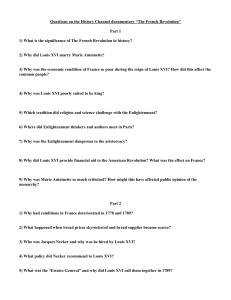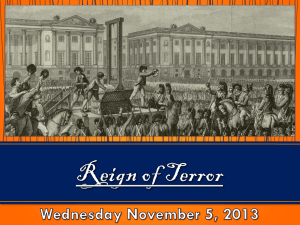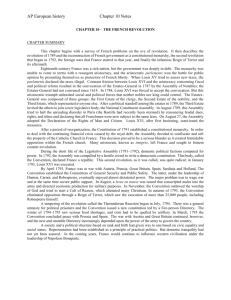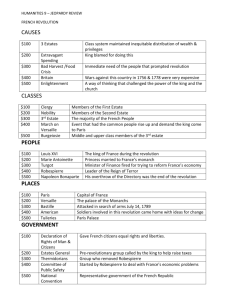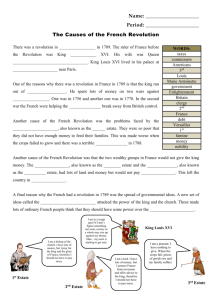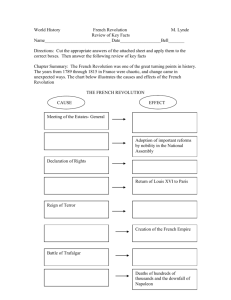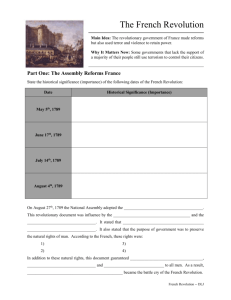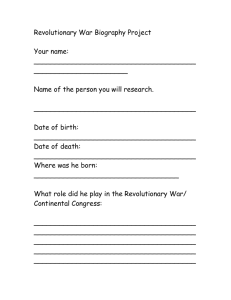The first modern revolution by A. J. P. Taylor
advertisement
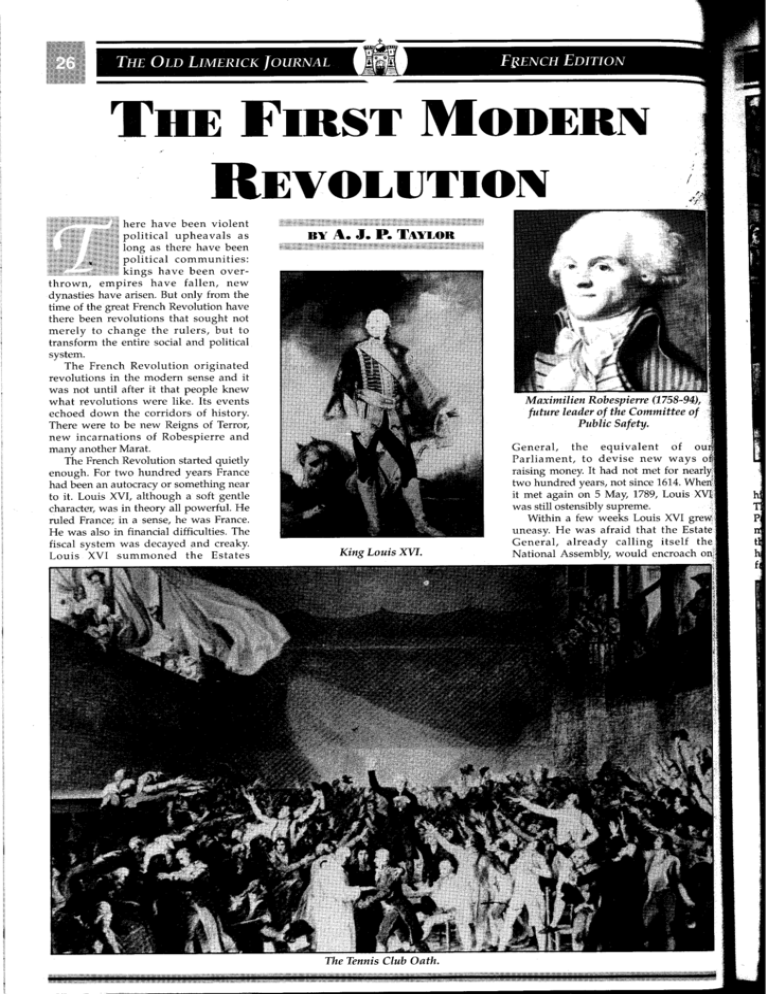
here have been violent olitical upheavals as g as there have been litical communities: ings have been overthrown, empires have fallen, new dynasties have arisen. But only from the time of the great French Revolution have there been revolutions that sought not merely to change the rulers, but to transform the entire social and political system. The French Revolution originated revolutions in the modern sense and it was not until after it that people knew what revolutions were like. Its events echoed down the corridors of history. There were to be new Reigns of Terror, new incarnations of Robespierre and many another Marat. The French Revolution started quietly enough. For two hundred years France had been an autocracy or something near to it. Louis XVI, although a soft gentle character, was in theory all powerful. He ruled France; in a sense, he was France. He was also in financial difficulties. The fiscal system was decayed and creaky. Louis XVI summoned the Estates Maximilien Robespierre (1758-9 future leader of the Committee Public Safety. King Louis XVI. General, the equivalent of Parliament, to devise new W raising money. It had not met for two hundred years, not since 1614. it met again on 5 May, 1789, Lou was still ostensibly supreme. Within a few weeks Louis XVI gr uneasy. He was afraid that the Est General, already calling itself th National Assembly, would encroach - Louis XVI accepts the constitution, 14 September, 1791. his powers. He decided to send it home. The National Assembly had not met in Paris. The old Estate General had always met wherever the king was and for more than a century past the kings of France had lived at Versailles. Paris, though by far the greatest city in France, was disregarded. The alarm spread in Paris that the National Assembly was to be dissolved. There was a spontaneous movement led by writers, journalists and orators. The symbol of royal power in Paris was the Bastille, a fortress of little real strength. It was garrisoned by a mere The Committee of Public Safety at work. thirty soldiers, most of them elderly pensioners. The Bastille fell after a brief assault and with it there fell also the French monarchy. On 14 July, 1789, the French monarchy lost its historic prestige. Louis XVI was no longer King of France; he was merely King of the French, committed to a constitution. Historic France had gone and with it the prestige of the historic aristocracy. A new France had to be created. The National Assembly, summoned for a simple fiscal operation, now had to build a new social and political order. The members of the National Assembly represented the educated classes of France, a highly educated country. The French Revolution was not forced on the people merely by economic hardships, though the poor were indeed very poor. There was a long background of writers who called themselves 'philosophers', whom we should call intellectuals. They held an entirely new outlook on life: reason instead of tradition, a confidence in man instead of apprehension, above all a belief that the principles of society could be formulated in a few simple sentences and would endure for ever. The French deputies of 1789 believed that they could make a clean sweep of the past. The monarchy was first defined bv a constitution and then in 1792 overthrown. The aristocrats lost their 'privileges and sometimes their land, though many of them survived as wealthy landed proprietors. The Church also lost its lands and was put under the direction of the state. The traditional The shooting of Robespierre. provinces-Normandy, Burgandy and so on-were abolished and replaced by new artificial dipartements. The great achievement of the early French Revolution was the Declaration of the Rights of Man. Its very title was revolutionary. Not the rights of the king, not the rights of the upper classes, not historic rights. The Rights of Man were the rights of every citizen and rested on reason, not on tradition. The Rights of Man in their first formulation were modest: liberty, property, security and resistance to oppression. This last was included in order to sanction the revolutionary acts of resistance to Louis XVI who was in reality far from being an oppressor. 'Liberty' was the assertion that every citizen had the right to do what he pleased unless it was against the law. 'Property' was to become a cause of conflict later and in subsequent revolutions. In the past nobles had had the right to do what they liked in their castles, but the ordinary people in cottages could not. The Right of Property meant the right of every cottager to be free. Later people began to ask a different question about property: was it really satisfactory that a property-owner could do whatever he liked with his property even if this injured others? Could the factory-owner say, 'This is my factory and I propose to close it even though this will throw my employees out of work'? This conflict of righg was to shape much of modern history.' In 1791, the king accepted the constitution. It was formally declared were confident that they were preparing that the revolution was over and that a new age and that history would begin France had become a modern country again from 19 September, 1792, when the revolutionary Convention met. They based on rationalism and the Rights of dated years from that event: Year I, Year Man. In practice the Rights of Man were a good deal restricted. Workers were I1 and so on. Even the names of the months were changed into fancy words denied the right to form trade unions. implying that it was a hot month or a The right of the citizen to be represented cold month or a month with flowers. All depended on his property. Only the 'active citizens' - those with property were symbols that the new France was had a vote. The others were described as starting from scratch. passive citizens, an inferior order. In The more practical need was to face theory universal suffrage was adopted the challenge of invasion and this second for a few months in 1793, but no election Revolution was more the offspring of during the French revolution was held panic than of novel ideas. In September, on its basis. 1792, there was a blind Terror, the From 1789 to 1791 there had been a massacre in the prisons, when priests, logical pattern. The leaders of the aristocrats and many others were killed. revolution c a d clear ideas where they In January, 1793, Louis XVI himself was were going. Thereafter events took executed. There was civil war in the charge. The peaceful transformation of Vendbe. Many cities-Lyons, Toulon and France into a constitutional country others-broke away from the government broke down. Louis had never sincerely in Paris, some to restore the monarchy, acquiesced in it. He stirred u p the others to set up a federal system. reactionary powers of Europe to The revolutionary government t gradually emerged from the confus intervene in France and they welcomed and alarm still claimed to poss the opportunity to weaken France or even to partition it. democratic principles and to speak War hung over France from the the people. In fact, it was concerned t beginning of 1792. That summer it issue orders to the people. It was provoked the fall of the monarchy. On 10 revolutionary dictatorship. All th August, the second vital date in the leaders of the French Revolution-like history of the revolution, Louis's palmost leaders of most revolutions-cam the ~Gileries(to which he had moved in * -'from the intellectual classes. They were October, 17891, was attacked. He took lawyers, journalists, professional men of refuge with the Assembly and was one kind or another. None were great aristocrats, none were peasants or formally dethroned. A month later the Republic was proclaimed. The French manual workers. All believed in orship of a revolutionary general. n, who had been a man of violence ime of the massacre in the prisons, d violence as a temporary and was anxious to restore an fe. Although he undoubtedly a patriotic line, he also made a forkne for himself. Danton did are the idealism of the extreme ns. When Robespierre spoke about ionary virtue, Danton replied, ly virtue I know is the one I every night with my wife'. rre was shocked. Perhaps this of the reasons why he later for Danton to be guillotined. spierre I find difficult to admire. find real greatness in of his passionate faith inism, not the creator of Jacobin He was however the only an ever known in any country to one 'The Incorruptible'. S this quality was more surprising nce than in some other countries. as incorruptible over as corrupted by power. He against power. He had ocracy. When he joined the Public Safety, he nciples. Though he still ts of Man, he declared suspended until the 1793, until July, 1794, lutionary government Pped at nothing in order to first a war of defence and then a carry liberty across vention resolved 'to the order of the &y'. 4e en masse by which ne was conscripted into my or the munitions the aged were instructed . Marat is stabbed t o death in his bath by Charlotte Cordey. to sit in the market places and encourage the recruits with patriotic songs. The French treasury had been almost bankrupt before the revolution. The mounting costs of the war made things worse. The Jacobins paid their way with paper money, that is, money they had not got. The result as we all know nowadays was inflation. The revolutionary government answered by the Law of the Maximum, freezing prices and to a lesser extent wages. The Maximum was enforced by Terror. Many of those brought before the Revolutionary Tribunal were therepot as traitors or aristocrats, but simply for infringing the Law of the Maximum. There has never been a greater test of the idea that you can &rid or inflation by controlling prices and wages. The attempt failed. Inflation stormed ahead until years later when Bonaparte resolved that the French state should live within its income. The sight of rich men making profits out of the war and the revolution led Robespierre and his close circle to a new view of virtue. The virtuous citizen was a patriot; he served in the armies; he observed the Law of the Maximum. The very fact of his poverty indicated that he was virtuous, thinking of France and the revolution, not himself. If a citizen was rich, it was clear that he was interested in other things than his public duties. Robespierre and his disciple Saint-Just drew the moral. The poor were virtuous and should therefore be rewarded by a redistribution of property in their favour. Rich citizens were by definition less virtuous and should be regarded with suspicion, if not actually sent to the guillotine. This doctrine, like the French tricolour, was to make the circuit of the globe. Robespierre and Saint-Just however had no time to apply their rule of virtue. Many members of the Convention had themselves made money during the war and they overthrew The Incorruptible in order to save their fortunes. In any case the need for revolutionary government was passing. By the summer of 1794, France was beginning to win the war. The national territory had been liberated. The natural frontiers as they were called had been reached. Between 1789 and 1794, France changed from a country with many different outlooks and even languages to a single nation. France had created nationalism. The nation could override tradition and history. Moreover France, as the Great Nation, could override the national claims of others. Here were the three themes that revolutionary France launched into the world and that have continued to haunt ever since. They developed in many different ways. Nevertheless the three revolutionary causes-democracy, nationalism, socialism-all sprang from the fall of the Bastille on 14 July, 1789. (Reprinted from Revolutions and Revolutionavies, 1980, Hamish Hamilton Ltd., London).
